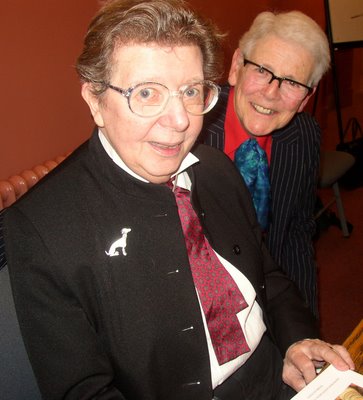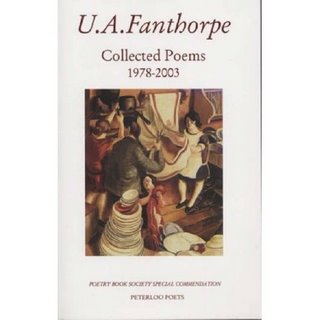UA Fanthorpe at the Chester Literature Festival

Last time the poet U A Fanthorpe came to Chester it was, if I remember correctly, in the less than ideal setting of the bar at the Gateway Theatre. At the time (1994) a quiet person came along with her and said not a word - but tonight this partner, Rosie Bailey, had a voice - and the two of them reading together gave the evening a dynamic and interesting edge. Here are the two of them at the book signing after the event. I am really pleased with this picture because I think their slightly mischievous character comes through. I am sure they would be very interesting and entertaining company.
 Each poem was introduced with an explanation of how they were written. One poem about ghosts - which I loved but cannot find in her collected works - described how old photographs evoke ghosts in the faces of the present and how in every face that we see today there is the promise of future ghosts.
Each poem was introduced with an explanation of how they were written. One poem about ghosts - which I loved but cannot find in her collected works - described how old photographs evoke ghosts in the faces of the present and how in every face that we see today there is the promise of future ghosts.Another poem was as the result of a challenge - to write a poem about washing up and so she wrote one about her mother washing up. The last stanza starts 'Oh I remember my magical mother dancing...' which reminds me of L Lee Lowe's post today which is haunting me too.
After a poem about her mother came one about her father (who thought her lucky because when very young she successfully found lug worms in the sand - and then, when he seemed to be dying apparently gave him two more years, just by being there).
Two poems I loved especially were 'After Visiting Hours' (about relaxing in hospital after the visitors have gone) and 'You'll be hearing from us shortly' . This was especially good because of what was left out. The usual run of interview questions is followed by a pause in which the interviewee has presumably answered the question (although this is not heard) and then there is a disparaging reply from the interviewer e.g. 'I see.' or 'Indeed.' It is very funny.
The reading was a good length - even with the best readers in the world it is difficult to listen to much more than an hour of poetry - and then the poet answered a few questions at the end: the longest time UA Fanthorpe has taken to write a poem was 4 years and was about her mother's death; she agreed it was important to be nosy in order to be a good poet and she reads other people's poems a lot - but only if they are not too addictive and too influential (she found that after reading a lot of Stevie Smith's poetry she was writing like her and presumably temporarily lost her own voice); she particularly favours Russian poets and thinks they translate into English very well.
UA Fanthorpe has an interesting history. After teaching at Cheltenham Ladies College for sixteen years (and head of the English department for eight) she decided to do something different. She became a receptionist at a hospital and only then started to write poetry. Thinking about this I wish I had asked the question I had wanted to ask but didn't get the chance. 'What is the best job for a poet - or any sort of writer?' I am pretty sure it is not teaching.
This is a bit of a rushed post I am sorry. It is getting late and I have an early start tomorrow.

7 Comments:
Your post certainly doesn't read as a rushed one - it was very interesting to read about UA Fainthorpe - a poet I have long admired. Meeting her in person must've been a thrill! and you are so right, the mischeviousness has certainly come across!
I saw these amazing women too. The poetry was marvellous but what also intrigued me was the wonderful rapport between them, the gentle womanly silences between the poems...A fabulous evening.
I love those sweet faces!
Something new to occupy my time. Your posts always inspire me to reach for something new.
CB: Ah, very kind, but it is - too many repetitions, but I am leaving it like it is. Glad to see you're back. You've been missed.
Jan: Yes, glad you enjoyed it.
Susan: They are sweet, aren't they - and Twitches - if I inspire you I'm delighted. I love to read your poems - each one makes me look at things in an entirely new way...and think again.
l think the poem is difficult to understand.
Which one, Fanny Jun?
Post a Comment
Comments are subject to moderation.
<< Home